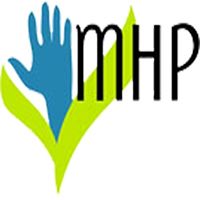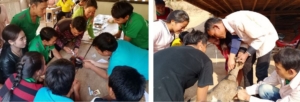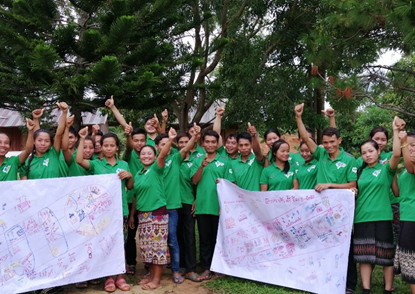Project
Ethnic Youth “Own” Action Research in remote Bokeo, Laos
-
Amount Funded
90,120 EUROProject Duration
01 May 2018 - 30 Apr 2020 -
-
Lead organisation
Maeying Huamjai Phattana (MHP) - Women Mobilising for DevelopmentPartners
CLICK and PADETC
-
Maeying Huamjai Phattana (translated as Women Mobilising for Fevelopment) or MHP, is a non profit association (or NPA) organisation which was founded in 2010. MHP seeks to strengthen the capacity of poor women and men especially in rural areas, so that they have a higher quality of life, in which they can take control of their destiny in sustainable ways. This includes proper management of non-timber forest products which can be used to improve income and ensure food security and nutrition for mothers and children. At the same time, there is a need to create awareness of gender issues, children’s and women’s rights and protection of the local environment. Finally, MHP aspires to strengthen the capacity of government staff associated with development work in Bokeo, as well as being part of a learning network for the northern provinces of Laos or throughout the country.
-
Organisation
Maeying Huamjai Phattana (translated as Women Mobilising for Fevelopment) or MHP, is a non profit association (or NPA) organisation which was founded in 2010. MHP seeks to strengthen the capacity of poor women and men especially in rural areas, so that they have a higher quality of life, in which they can take control of their destiny in sustainable ways. This includes proper management of non-timber forest products which can be used to improve income and ensure food security and nutrition for mothers and children. At the same time, there is a need to create awareness of gender issues, children’s and women’s rights and protection of the local environment. Finally, MHP aspires to strengthen the capacity of government staff associated with development work in Bokeo, as well as being part of a learning network for the northern provinces of Laos or throughout the country.
-
Project
The project Ethnic Youth own Action Research in Bokeo aims to test and scale up a positive change approach that enhances the abilities of Maeying Huamjai Phattana (MHP) to provide a voice to rural and ethnic youth (men and women). The action research provides an opportunity to identify and document the issues that ethnic youth feel strongly about in their own communities and make positive changes through social media and smartphone technology. With rapid economic development, ethnic youth are facing new challenges, including access to education, reproductive health and migration. MHP has identified that youth and the issues they face are not sufficiently addressed in their existing programmes, since these tend to target village leaders and government partners. The project focuses on learning (for both youth and MHP), taking advantage of a rapidly expanding technology (the smartphone) which is capable of disrupting traditional development pathways. The project tests this approach in four villages in two trial locations (Meung and Phaoudom district), with the intention of scaling up to other areas in Bokeo. There are four expected results:
- The opportunities and challenges facing rural youth are identified, prioritised and documented through quality research in four villages.
- A representative in the village youth committee is trained and capable of leading positive change in their community
- An action plan to achieve positive change within the community is formulated and endorsed by community youth and approved by MHP.
- The village youth committee has the technical support to implement their concept successfully.
The issues to be addressed are chosen by the young people themselves in each district, based on input from a survey on the views of young people and from the outputs of Gender Action Learning (GALs) tools. Importantly, the chosen issues do not have to conform with the strategic plan of MHP: MHP acts only as a facilitator of change and solutions to the chosen issues will be directly implemented by the youth themselves via direct financial support. A youth committee is established as part of the project to co-ordinate the implementation with the coaching support of MHP. This committee will report project progress, its challenges and opportunities via regular updates on social media platforms popular with young people (through stories, pictures, short videos), with the intention of building an audience from other villages and beyond, thereby scaling up peer- to peer sharing and learning, and linking the GALs methodology to mobile technology. The project will benefit the local community by empowering local youth, overcoming negative stereotypes and encouraging them to make a greater contribution to community development. MHP will ensure that young women and girls make up at least half of all committee members and beneficiaries. To ensure the success of the project and develop MHP’s own capacity, MHP will partner with CLICK, which has experience in research, story-telling and documentation, and PADETC, which has developed successful youth leadership and empowerment programs in other parts of Laos.
-
-
The project Ethnic Youth own Action Research in Bokeo aims to test and scale up a positive change approach that enhances the abilities of Maeying Huamjai Phattana (MHP) to provide a voice to rural and ethnic youth (men and women). The action research provides an opportunity to identify and document the issues that ethnic youth feel strongly about in their own communities and make positive changes through social media and smartphone technology. With rapid economic development, ethnic youth are facing new challenges, including access to education, reproductive health and migration. MHP has identified that youth and the issues they face are not sufficiently addressed in their existing programmes, since these tend to target village leaders and government partners. The project focuses on learning (for both youth and MHP), taking advantage of a rapidly expanding technology (the smartphone) which is capable of disrupting traditional development pathways. The project tests this approach in four villages in two trial locations (Meung and Phaoudom district), with the intention of scaling up to other areas in Bokeo. There are four expected results:
- The opportunities and challenges facing rural youth are identified, prioritised and documented through quality research in four villages.
- A representative in the village youth committee is trained and capable of leading positive change in their community
- An action plan to achieve positive change within the community is formulated and endorsed by community youth and approved by MHP.
- The village youth committee has the technical support to implement their concept successfully.
The issues to be addressed are chosen by the young people themselves in each district, based on input from a survey on the views of young people and from the outputs of Gender Action Learning (GALs) tools. Importantly, the chosen issues do not have to conform with the strategic plan of MHP: MHP acts only as a facilitator of change and solutions to the chosen issues will be directly implemented by the youth themselves via direct financial support. A youth committee is established as part of the project to co-ordinate the implementation with the coaching support of MHP. This committee will report project progress, its challenges and opportunities via regular updates on social media platforms popular with young people (through stories, pictures, short videos), with the intention of building an audience from other villages and beyond, thereby scaling up peer- to peer sharing and learning, and linking the GALs methodology to mobile technology. The project will benefit the local community by empowering local youth, overcoming negative stereotypes and encouraging them to make a greater contribution to community development. MHP will ensure that young women and girls make up at least half of all committee members and beneficiaries. To ensure the success of the project and develop MHP’s own capacity, MHP will partner with CLICK, which has experience in research, story-telling and documentation, and PADETC, which has developed successful youth leadership and empowerment programs in other parts of Laos.
-
The project was successful in completing all of its activities according to the initial plan. 53 percent of women involved in project activities (23 people out of 43 in the four villages) became capable of expressing their opinions at meetings and felt respected by the men at these meetings. The youth developed life plans that express their goals and how they planned to achieve them, as well as how they planned to contribute to their community in the future. The youth also gained skills to use technology (the mobile phone) and learned how technology may be used in a positive way in their development. As such, the project has given marginalised youth a voice, allowing them to collaborate in expressing their goals, as shown by the following testimonies:
“We want to be self-sufficient, strong, and able to analyse the issues confronting us to improve the lives of ourselves and our families. We want to construct a meeting hall, save our bamboo shoots, improve goat raising, and develop our village.” – Youth participating in the project
“Female youth were initially embarrassed and afraid to speak to others, but project activities helped them open up, and they now have more confidence and conversation skills.” – Youth participating in the project
“Before the project, I was very shy and would never have dared to attend a village meeting, but now I am braver and have gone to trainings organised in another district and gained new knowledge. I now go to the village meetings on a regular basis.” – Youth participating in the project
The youth learned team leadership, group administration, and an understanding of personal, group, and village development. They created a strategic plan and an activity plan to address the issues identified in the research, with 51 people (28 women) in the four villages participating in the strategic planning process. Within the four villages, 38 people (14 women) developed a strategic plan using the Gender Action Learning System (GALS) to analyse and improve gender relationships, with 19 people (7 women) capable of passing on their gender knowledge to others. The youth in the four villages then wrote a small project proposal document and submit to MHP for funding.
Each village produced two videos about their issues, which were viewed at the village level. The videos created by the youth on their research topics sparked discussions, with the entire communities gathered to watch and discuss them for several hours. During district-level exchange visits, the other villages watched the videos from each village. The youth were eager to create more videos, possibly on a family level, in order express challenges that their own households faced in the communities.
Photos

- Problem analysis, Youth gather data on cattle raising, Showing video to the community.

2. Video editing using a phone, Showing video to the community, Using the Gender Action Learning System (GALS) to analyse problems.
 3. Training how to treat and protect the animal to veterinarian group.
3. Training how to treat and protect the animal to veterinarian group.  4. Teamwork, Leadership and Group Management training.
4. Teamwork, Leadership and Group Management training. - News




 3.
3.  4.
4. 

